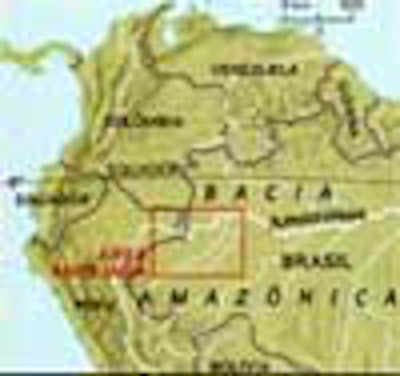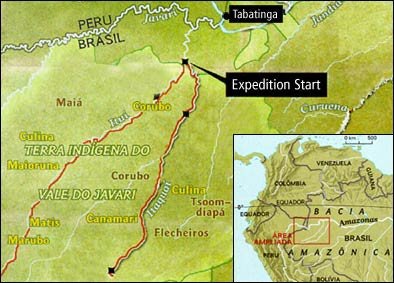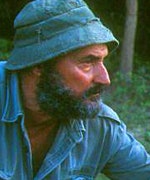
The Vale do Javari is an isolated region in the Amazon jungle of Brazil, covering about 20.7 million acres between the Ituí and Itaquaí rivers along the border with Peru and Colombia. The region is home to more than 50 tribal cultures, some of whom have never been contacted by the outside world -- and many of whom who hope that it stays that way.
Protecting these people from the predations of the outside world has become an important goal of the Brazilian government and its Federal Indian Department (FUNAI). Although the Vale do Javari was declared an Indian reservation in 1996, it is still under continuous pressure by cattle, logging, and mining interests.
Many of the uncontacted tribes are remnants of former Indian nations who have fled deeper into the jungle after violent encounters with the outside world, according to Korubo.com. Tribes can range in size from a few people to several hundred, and till manioc and maize on small plots hacked out of the jungle. They frequently pull up and move to a new location if they feel threatened.
 |
| Heading south from Tabatinga, the Vale do Javari Expedition will provide high-quality healthcare to tribes in the remote region between the Ituí and Itaquaí rivers along Brazil's border with Peru and Colombia. |
Because of their isolation, the tribal peoples often lack immunities to Western diseases, and can be devastated by pathologies that are relatively benign in more developed parts of the world. Infectious diseases such as hepatitis A, B and Delta; yellow fever; malaria; and tuberculosis are particularly deadly.
Sydney Possuelo, co-leader of the Imagem do Javari Expedition, has made it his personal mission to befriend and protect the indigenous peoples of the Amazon. Possuelo was instrumental in prompting FUNAI to adopt a more benign policy toward indigenous groups after a history of sometimes violent and tragic interactions. He now leads the Department of Unknown Tribes within FUNAI.
 |
|
Sydney Possuelo.
|
Contacting unknown tribes remains a controversial concept. Past contacts -- even those with the best intentions -- have often resulted in disaster for tribes inadvertently exposed to Western diseases. In addition to suffering from disease, tribes often become fragmented as they disperse, and in the process many lose access to tribal shamans who have knowledge of herbal and traditional remedies that have been passed down over the generations.
Possuelo's philosophy regarding contact with unknown tribes is to try to limit it as much as possible, only making contact if a tribe is threatened, and when legal demarcations can be put in place to protect tribes from outside influences.
Possuelo's efforts have won him international recognition and awards, but are not universally popular in Brazil. He has received death threats, believed to come from timber companies interested in logging in the Vale do Javari. He has contracted malaria nearly 40 times, and was severely injured in an auto accident during one expedition.
By Brian CaseyAuntMinnie.com staff writer
April 2, 2004
Copyright © 2004 AuntMinnie.com



















